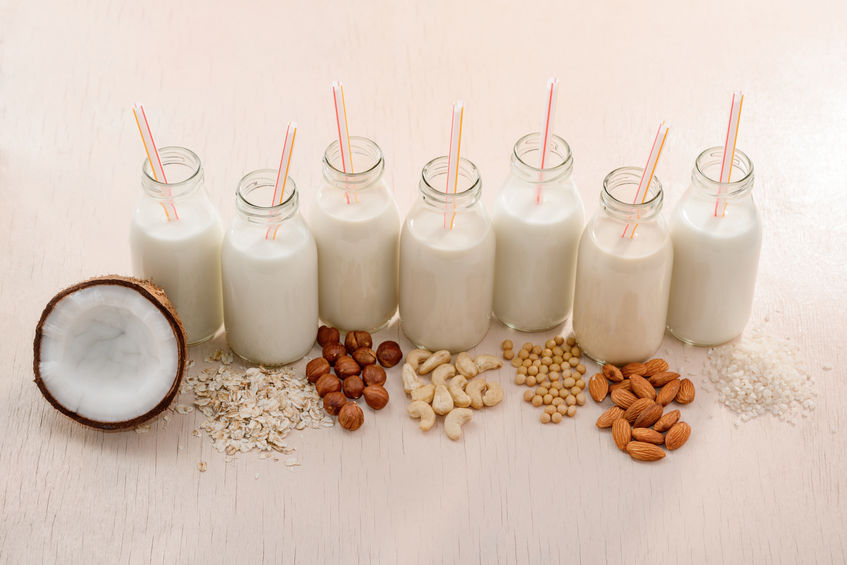The Skinny
There is nothing wrong with cow’s milk. An 8-ounce dipper is chocked with all sorts of important nutrients and vitamins. Besides offering up healthy dollops of calcium, phosphorous and B vitamins, a single cup of whole milk has 8 grams of protein, 13 grams of carbohydrates, 8 grams of fats and 146 calories. Of course, milk isn’t for everyone. In fact, there are a growing number consumers who seek alternatives for personal preferences or medical issues.
These issues include the perennial concern of being lactose intolerance. However, they also extend to those having milk allergies, concerns about inflammation or individuals suffering from Crohn’s, Colitis or inflammatory bowel syndrome. Some consumers seek options to avoid any antibiotics, pesticides, or hormones used in the production of dairy milk. Others simply sidestep cow’s milk because they adhere to a vegan or lifestyle diet or because they just don’t like the creamy taste.
So, what are the options? There are plenty with consumers gravitating to various alternatives based on their particular taste preferences and dietary issues. Here are some of the leading alternatives.
The Slate
Oat Milk
A trendy alternative, oat milk draws consumers because of its creamy, lightly flavored taste that makes it a great addition to coffee, tea, cereal or a homemade smoothie. High in fiber, it is lower in protein at 2-4 grams than a cup of non-fat cow’s milk or soy-based versions that hold 8 grams each.
Rice Milk
Considered the least allergenic alternative, rice milk is often a favorite of those suffering from allergies or intolerances to dairy, gluten, soy or nuts. Mild in taste and somewhat sweet, it has a watery feel that is high in carbohydrates and low in protein and fat compared to cow’s milk. One cup contains 130–140 calories, 2–3 grams of fat, 1 gram of protein and 27–38 grams of carbohydrates.
Hemp Milk
Made by blending hulled hemp seeds with water, hemp milk usually contains high levels of magnesium, calcium and vitamin D. It also contains omega-3 and omega-6 fatty acids and about 3 grams of protein. It comes in at 60 calories per cup. Boasting an ultra-nutty flavor, hemp milk is very low in fiber.
Cashew Milk
Thought to be a great addition to teas and lattes, it can also provide a mind boost from its inherent L-theanine, a compound found in matcha that is linked to cognition and focus. Made in a similar way to almond milk—soaking, blending with water and straining—it has about 40-50 calories per cup. It also offers up zinc, copper and magnesium to support immune systems.
Coconut Milk
It’s not surprising that coconut-based milks have a rich, creamy coconut taste, but they are also much lighter than canned coconut milks. Higher in fat than almond milk, the newer, water-based versions are usually significantly lower in calories than dairy milk. Traditional canned versions can be very higher in calories and fat.
Quinoa Milk
This alternative stacks up well cow’s milk in terms carbohydrates but has fewer than half the calories and significantly less fat and protein at 3 grams and 7 grams respectively. It does offer 27 grams of carbohydrates and 3 grams of fiber. The combined impact makes gives quinoa milk a fairly well-balanced nutrition profile compared to other nondairy milks.
Almond Milk
Very popular with lots of competing brands, almond milks range in calories between 35-90 per cup. Made mostly of almonds and water, plus other emulsifiers and fortifying nutrients, low-calorie brands provide about 1 gram of protein and fiber per serving. Given its low protein levels, many users consider adding a nut butter or chopped nuts to any smoothies they are making with almond milk.
Soymilk
A long-standing mainstay in the alternative milk market with lots of brands, soymilk has 80 calories per cup, 4 grams of fat, 0.5 grams of saturated fat, 3 grams of carbohydrates, 2 grams of fiber, 7 grams of protein and 1 gram of sugar. It comes in lots of sweetened and unsweetened options and flavors.
Flax Milk
A relative newcomer to the alternative milk aisle, flax milk offers a low-calorie, low-fat alternative to cow’s milk. At just 50 calories per cup, it also provides a high level of omega-3 fatty acids, 8 grams of protein and 7 grams of carbohydrates. It is also reputed to be pretty tasty.
Pea Milk
Strange but true, this is a plant-based alternative made from pea proteins that come from yellow peas. Lots of flavored, sweetened and unsweetened varieties, straight up pea milk has just 70 calories per cup, 8 grams of protein and 4.5 grams of fat. It also provides a very healthy dose of calcium and zero carbohydrates.
Eyes Up
Did we miss something? Let us know at info@wellwellnj.com.












